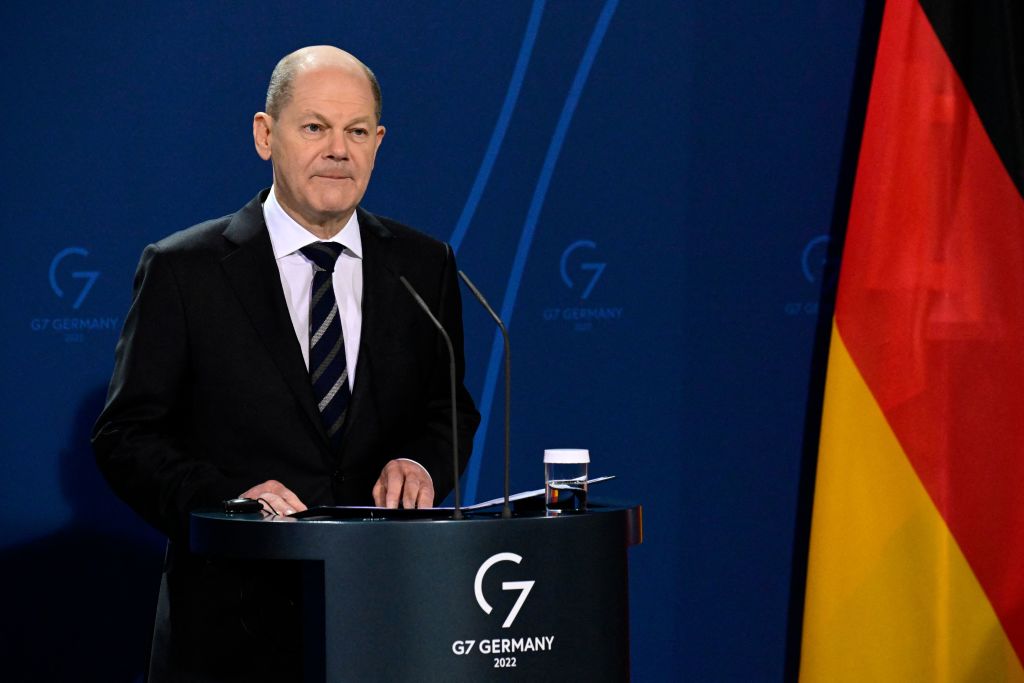Germany is a major wild card in the West's efforts to deter Russia in Ukraine


A free daily email with the biggest news stories of the day – and the best features from TheWeek.com
You are now subscribed
Your newsletter sign-up was successful
The U.S. and its European allies are readying troops and sending armaments to Ukraine or NATO's eastern flank to deter, or respond to, Russia's possible invasion of Ukraine. At least most of them are. "In recent days Germany — Europe's largest and richest democracy, strategically situated at the crossroads between East and West — has stood out more for what it will not do than for what it is doing," The New York Times reports.
Germany has a long, complicated relationship Russia, and the party of new German Chancellor Olaf Scholz, the Social Democrats, have traditionally favored working with the Russians rather than confronting them. "Germany's evident hesitation to take forceful measures has fueled doubts about its reliability as an ally," the Times reports, "and added to concerns that Moscow could use German wavering as a wedge to divide a united European response to any Russian aggression."
The Biden administration has gone out of its way to show confidence in Berlin, but even that is being viewed by some as a sign of concern. "It is telling that the U.S. has to publicly reaffirm its trust in Germany," Jana Puglierin of the Berlin-based European Council on Foreign Relations told the Times. "That used to be a given."
The Week
Escape your echo chamber. Get the facts behind the news, plus analysis from multiple perspectives.

Sign up for The Week's Free Newsletters
From our morning news briefing to a weekly Good News Newsletter, get the best of The Week delivered directly to your inbox.
From our morning news briefing to a weekly Good News Newsletter, get the best of The Week delivered directly to your inbox.
Prominent leaders in Germany have warned against bargaining with the Nord Stream 2 pipeline that will bring natural gas to Germany from Russia, and others argue that proposals to freeze Russian banks from the Swift payment transaction network would harm Germany's economy. "Germany's muddled stance has been especially unsettling to Ukraine and some of Germany's eastern neighbors," the Times says, and they have not been shy about criticizing Germany's waffling.
The doubts about Germany's willingness to confront Moscow is one potential obstacle to a united Western response to a Russian invasion, but it's not the only one. "The EU, U.S., and other Western allies are adamant that Russia will face heavy sanctions if it attacks Ukraine — but there is widespread uncertainty over what would constitute an attack short of a full-scale invasion," Politico reports.
Russian President Vladimir Putin "well recognizes that Europe's main power base is France, Germany, and Britain," British lawmaker Tobias Ellwood told The Washington Post. "If these three countries are united, the rest of Europe follows. If you can sow divisions among these three, then there's no leadership, there's no coordination, and there's no unity."
A free daily email with the biggest news stories of the day – and the best features from TheWeek.com
Peter has worked as a news and culture writer and editor at The Week since the site's launch in 2008. He covers politics, world affairs, religion and cultural currents. His journalism career began as a copy editor at a financial newswire and has included editorial positions at The New York Times Magazine, Facts on File, and Oregon State University.
-
 Corruption: The spy sheikh and the president
Corruption: The spy sheikh and the presidentFeature Trump is at the center of another scandal
-
 Putin’s shadow war
Putin’s shadow warFeature The Kremlin is waging a campaign of sabotage and subversion against Ukraine’s allies in the West
-
 Media: Why did Bezos gut ‘The Washington Post’?
Media: Why did Bezos gut ‘The Washington Post’?Feature Possibilities include to curry favor with Trump or to try to end financial losses
-
 Putin’s shadow war
Putin’s shadow warFeature The Kremlin is waging a campaign of sabotage and subversion against Ukraine’s allies in the West
-
 Rubio boosts Orbán ahead of Hungary election
Rubio boosts Orbán ahead of Hungary electionSpeed Read Far-right nationalist Prime Minister Viktor Orbán is facing a tough re-election fight after many years in power
-
 Alexei Navalny and Russia’s history of poisonings
Alexei Navalny and Russia’s history of poisoningsThe Explainer ‘Precise’ and ‘deniable’, the Kremlin’s use of poison to silence critics has become a ’geopolitical signature flourish’
-
 Key Bangladesh election returns old guard to power
Key Bangladesh election returns old guard to powerSpeed Read The Bangladesh Nationalist Party claimed a decisive victory
-
 US, Russia restart military dialogue as treaty ends
US, Russia restart military dialogue as treaty endsSpeed Read New START was the last remaining nuclear arms treaty between the countries
-
 What happens now that the US-Russia nuclear treaty is expiring?
What happens now that the US-Russia nuclear treaty is expiring?TODAY’S BIG QUESTION Weapons experts worry that the end of the New START treaty marks the beginning of a 21st-century atomic arms race
-
 Epstein files topple law CEO, roil UK government
Epstein files topple law CEO, roil UK governmentSpeed Read Peter Mandelson, Britain’s former ambassador to the US, is caught up in the scandal
-
 Iran and US prepare to meet after skirmishes
Iran and US prepare to meet after skirmishesSpeed Read The incident comes amid heightened tensions in the Middle East
